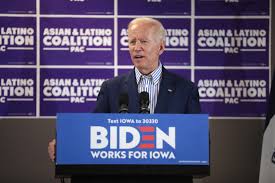PROSPECTOR POLITICAL PUBLISH WEEK #21: THE PROSPECTOR ENDORSES JOE BIDEN FOR THE DEMOCRATIC NOMINATION

April 10, 2020
EDITOR’S NOTE: We understand that Vermont Sen. Bernie Sanders dropped out of the race for the Democratic primary on April 8, but our endorsement for former Vice President Joe Biden still stands due to our beliefs in realistic policy. This editorial appeared in Issue #7 of The Prospector under the title “Realistic policy key for Dem nomination” and 22 Prospector staff members out of 26 agree with the following editorial.
The Washington Post states that youth voter turnout reached a “100-year high” in the 2018 midterm elections, and NPR reports that double the amount of women ran for Congress in 2018 as compared to 2016 — many of whom poise themselves as advocates for the younger generations of Americans. Throughout the past two years, people like Greta Thunberg and organizations like March for Our Lives have opened up the global conversation of youth in politics and how the fact that we are teenagers does not make our opinions any less valid.
The 2020 election is not only one of the most historic, but it is also expected to break records of youth voter turnout. In fact, a Prospector survey of 350 students shows that about 90% of eligible voters plan to exercise their constitutional right come Election Day.
With that said, the need to follow a candidate that personally reflects an individual’s views cannot be stressed more in these highly partisan times. The Prospector is writing this editorial to show which candidate for the Democratic nomination for President of the United States we support based on what reflects student opinions and who we feel can actually fulfill their promises of addressing issues of concern.
Many of us are students looking into our futures and wondering how we are going to get by in life when issues such as student loan debt and health care are very real concerns in terms of economic prosperity. Former Vice President Joe Biden and Vermont Sen. Bernie Sanders are the two remaining candidates left in the field for the Democratic primary, and each have their own approaches on how to solve these issues.
With Biden representing the moderate wing and Sanders representing the progressive wing of the Democratic Party, the distinctions between the two on these vital issues are crystal clear. Biden wants to build on the Obama-era Affordable Care Act, better known as Obamacare, by lowering the cost of prescription drugs and building towards a public health care option.
Sanders, on the other hand, wants to pass his legislation of Medicare for All by making health care a universal right guaranteed to all Americans.
Regardless of the plan, it needs proper reform as 30% of Prospect students care for better health care plans than the current ones in place according to the Prospector survey.
These two approaches have been hotly debated across the country throughout the treacherous election cycle, and the biggest concerns of American voters have been how these plans will be funded and how their private health insurances will be protected. Much opposition has arisen for the Sanders plan because of the nearly $60 trillion price tag — which is three times the size of the American economy. The fact that about 150 million Americans would be forced off their private insurance and possibly result in them receiving worse care than they already have is a major problem with this policy.
When it comes to student loan debt, an issue that nearly 25% of Prospect students care for the most, the two nominees are once again highly divided on their policies. Biden plans to make two-year community colleges free and use money earned from raising taxes on the super wealthy (the top 1% of Americans) while Sanders fights for forgiving the $1.6 trillion of national student loan debt and making all four-year public colleges free. While the Sanders plan does seem to be the far more appealing one, the questions of reality come into play in terms of actually getting it done.
Biden’s plan has a price tag of $750 billion, and the Sanders plan has one of $2.2 trillion — both of which are immensely large investments. However, the Biden plan has a clear outline of how the money will be made, and his 36-year congressional history of working across the aisle with many Republicans enhances the likelihood of his plan going through.
The same claim cannot be made for Sanders’ plan due to an unclear explanation for the payment of his absurdly large policies and how he intends to get Republican support for a very progressive plan. Most Republicans in Congress are not fond of proposals that deal with tax raises, and it seems as though the Sanders plan will struggle to get votes when most of the payment comes from high tax raises on the wealthy. While Biden’s plan does deal with raised taxes on large wealth, it is not to the same extreme and has shown past indication of conservative support.
While economic success is vital to the future of Prospect students, our survey shows that nearly 50% of students point to the global threat of climate change as the most important political issue for the 2020 election. Both of the Democratic nominees have laid out extensive plans in order to combat this crisis, but the ultimate deciding factor is which one will receive bipartisan support and actually break through the Washington gridlock.
This environmental phenomenon is something that can no longer be brushed off and debated upon with no action. Congress has the power to address life-changing issues with bipartisan support, and it is time for a leader who can successfully do so in an ambitious and effective manner — whether it be climate change or the gun violence epidemic that, with over 38% of votes, was another top issue for students.
The policies of these candidates can be discussed for hours on end, but one of the most important factors to mention about these two men is a very real concern for American voters: their ages. If Biden wins the presidency, he will be 78-years-old at the inauguration, and Sanders would be 79-years-old — meaning they would be well into their 80s when it is time for reelection.
Considering Sanders suffered from a heart attack during the election cycle and real worries have arisen about Biden’s mental state in terms of his vulnerability to Alzheimer’s and dementia, it makes sense that many Americans are hesitant to elect such elderly individuals. However, the two men have shown in recent time that they are more healthy than what meets the eye through doctor support on their ability and capacity to lead the country.
With all of that said, America needs a leader who is not only healthy but will deliver on their campaign promises by showing realistic change from both parties and making sure our economy prospers by not crumbling from checks we as Americans cannot cash. We need realistic economic proposals in a time where the lines of fact and fiction are blurred by immense sensationalism.
We, The Prospector, officially endorse Joe Biden for the Democratic nomination to be the President of the United States of America because we feel that his past vice presidential and congressional experience in public service more than qualifies him to take on the highest office in the land. On top of that, we feel that his plans to make health care more affordable, ensure that our students are not crippled by student loan debt, take action on gun violence, truly work toward combating climate change and have a female running mate as a method of empowering women are realistic, admirable proposals that can get bipartisan support in a divided era.
Biden has embraced many plans proposed from previous nominees for the Democratic primary and shows himself as a truly unifying nominee who will address a plethora of issues both moderate and progressive. He is the candidate who will hear the concerns of a young generation while truly uniting our country in some of its most partisan times.





















































































